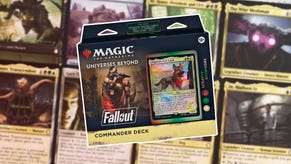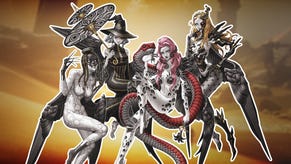Robert Yang's New Game Asks: Can You Suck A Man's Gun on Twitch?
We talk to Robert Yang about his new "historical bathroom simulator" The Tearoom, and what it's like basically being Twitch's Public Enemy Number One.
This article first appeared on USgamer, a partner publication of VG247. Some content, such as this article, has been migrated to VG247 for posterity after USgamer's closure - but it has not been edited or further vetted by the VG247 team.
While I'm hesitant to put a NSFW label on this, I recommend exercising caution if you're reading this at work or on a big-ass phone in public or something. Or not, screw 'em. Read what you want in public or at work.
It's normal for games to have "guides." Yet I can honestly say that I've never seen a game developer recommend reading a 180 page sociological study on men anonymously having sex with other men in public bathrooms prior to playing a game. But here we are with game designer Robert Yang's The Tearoom, a game that depicts the secretive, harrowing lengths men of all backgrounds would go to for sex within a 1960s Mansfield, Ohio restroom. Sex that unfortunately wasn't so secretive as hoped after all.
This "tearoom," typically a restroom where men visit to anonymously have sex with other men (consented visually and nonverbally via widely understood codes of sorts), was the subject of a "sting" operation by police. With a two-way mirror, this particular tearoom was secretly under surveillance, where cops eventually charged dozens of unsuspecting men for sodomy. Because even within a semi-private space, and even though the acts were harmless, it was still "public." For Yang, Laud Humphrey's extensive social research on the Tearoom Trade is not only an essential guide to this field of often-ignored gay history, but to understanding the strategies behind the game itself.
Tearooms weren't just a haven for gay men, but a way of reclaiming a space for them, and only them in private. "Once I found out about [Humphrey's Tearoom Trade and William E. Jones' "found documentary" Tearoom about Mansfield], to me, it was a really queer intersection of how sex affects politics, and how they inform each other," Yang said over the phone. "How you can't have sex without politics, and you can't really have politics without sex either. It was a really clear distillation of something that I wanted to explore somehow."
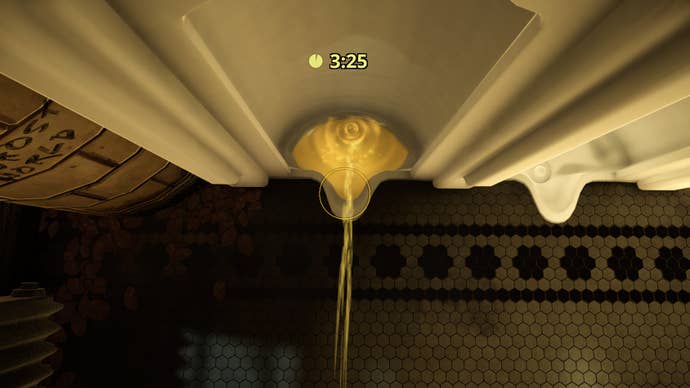
I've just finished playing The Tearoom, Yang's latest gay sex game. (He's made more than a few in the past.) Except for in The Tearoom, it's not really sex. Not explicitly at least. The Tearoom is a game that pins the player in a grimy bathroom littered with graffiti on nearly every surface and a bladder that never seems relieved, no matter how much the player urinates. The Tearoom, at its core, is a game about "sucking off another dude's gun." And in the context of The Tearoom, that gun is quite literal, with a fleshy Kalashnikov AK-12 dangling out of an anonymous grown man's pants. As per Yang's logic in the face of his games getting banned on streaming platforms, games don't have a problem with guns like they do with penises, right?
The core loop of The Tearoom is to build your arsenal, kinda like a lot of other games. You stand at a urinal. Periodically you'll hear and see a car drive up. Then a man walks inside, and he will pee alongside you at the stable of urinals (the realistically rendered "Cadillac of urinals," according to Yang's artist statement on the game). There are audio and visual cues to tell if a man may be interested in something more than just urinating; he'll sigh profusely, he'll nervously look over his shoulder towards the door, he may nervously cough to get your attention.
If he's interested, you can maintain eye contact and initiate something more: contact that materializes in you licking the dude's literal gun with a comically large tongue. As you lick the gun, the fleshy tone evaporates and a gunmetal finish takes over. When you "finish" him, a mixture of moaning, guns firing, and milky white gun oil splashes on the screen.
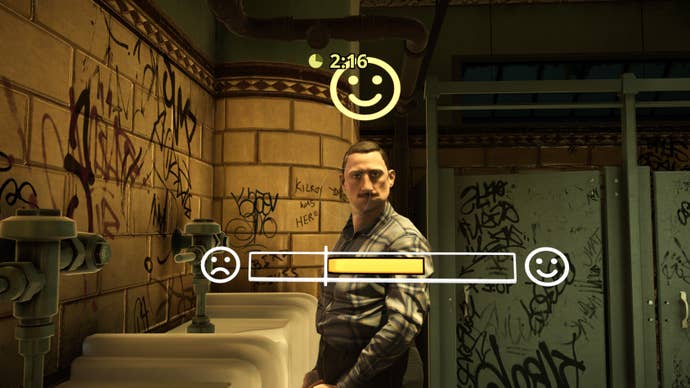
There's music soundtracking all this too, chiming in when a vehicle pulls up and parks outside. The music feels ironic, with my unwieldy tongue licking up a gun as the country band, The Lonesome Billies, sing about picking up some girls around town. But here I was, doing the opposite in private. "I actually had trouble finding a band that wanted to associate with me, because I dunno, I guess they really didn't want to associate with a weird gay sex game or something," said Yang of his quest to find the perfect country band. "I like [The Lonesome Billies] because I think they resemble the tone of the game, that they're arching back to a past era of country but they're also kind of modern. They're kind of punky a little bit and poppy a little bit. I feel this game has those same sensibilities. Kind of gesturing back to the past and the history and context, but also trying to think about what's contemporary and important now."
After you're done licking a gun clean—which takes anywhere from a few licks to upwards of 20—you get a trophy. A gun floats in the air, and then you have another gun to add to the collection. A weapon, now left dangling through a glory hole in a bathroom stall. The gun's flaccid now, no longer stiff. Your eventual goal is to build up a collection of eight shiny guns. There's a catch though. As there's always a catch in a surveillance state.
There's a 23 percent chance that the dude you're sucking off is a cop. And if they're a cop, you're arrested, and your gun collection plummets to zero; your progress is erased. This is a direct reflection of the exploitation of a real tearoom, like the one in Mansfield where men were filmed secretly through a two-way mirror. As per the "23 percent," the statistic was directly lifted from a UCLA study in 2015 where 23 percent of perpetrators of abuse or violence from a stranger against someone in the LGBT community came from a police officer. Yang's not a stranger to implementing relevant statistics into the coding of his games. In fact, he did it with a prior game too, the "activist autoerotica" Stick Shift.
"Instead of putting weird racist, sexist bad politics in the game code, what if we embedded progressive politics in the game code."
"I feel like a lot of video games embed politics in their game code and game rules," said Yang. "A lot of them aren't honest about them, which is kind of the problem." Of games with eyebrow-raising code, Yang cited the game Dead Island, which had the phrase "Feminist Whore" describing a female character's skill. The developers defended themselves and pointed the mishap to one programmer. Yet as Yang noted, through playtesting and other designers fiddling with the massive triple-A title, it's unlikely that only one person saw the phrase.
"I feel like instead of putting weird racist, sexist bad politics in the game code, what if we embedded progressive politics in the game code too," said Yang. "That's where I thought, okay what if I went the other way and try to do like anti-racist, anti-sexist, or anti-homophobic kind of political things, and not be apologetic about it, and hopefully it doesn't turn into a weird scandal or something. Just say honestly "this was my intent," and that's directly in the game code and that's how algorithms affect our digital experiences."
As such, Yang's been completely transparent with why his code implements real world statistics—they're meant to replicate how gay men felt then with the constant worry of potential surveillance or getting caught by others in the act (and still feel in today's still-existing tearooms). As per another probability programmed in The Tearoom, 5.82 percent of the NPCs you meet will be black, a reflection of Mansfield's own relative rarity of diversity at the time.
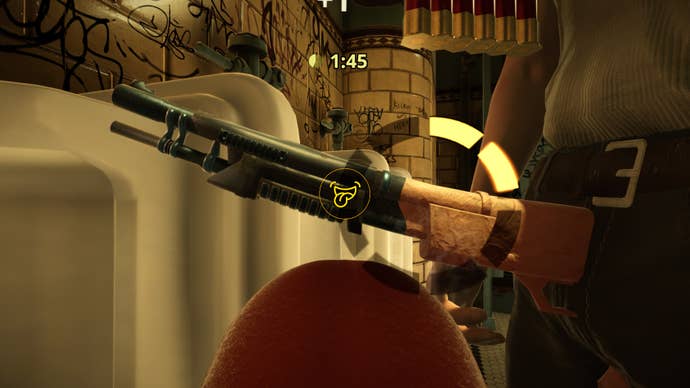
For the police, 23 percent feels awfully high in the context of the game, but it's intentional. It's some of the most palpable tension I've felt in a game this year. Reading visual and audio cues, hoping that the man residing near me doesn't trap me into getting arrested. Where even their apparent horniness of them coughing to get my attention incessantly feels like a trap to catch me in the act and arrest me. And honestly, it usually is. It carefully, but assuredly, captures that awkward, quiet fear of partaking in tea-rooming at all. The price men paid to be themselves for a moment.
A lot's changed since 1962 though, the setting of this game and when tearooms thrived a lot more widely. Gay spaces have slowly gone virtual, with Grindr, Scruff, apps galore. As Yang noted, in a way, this is partially a celebration because gay culture is "spreading everywhere." But in a sadder sense, it's also a loss of a geographical kind of gay community; a physical space that once was but is no longer. San Francisco, once a haven for the gay community, has slowly been shuttering gay and lesbian bars as the tech boom has driven people out of the city due to skyrocketing rents. In New York City, gay bars are getting harder and harder to find (at least according to Yang's own observations).
"Tearooms still exist," said Yang. "In Russia, I can imagine the tearooms are just bumpin' off the charts because you can't really be sexual out in the open, right? That means you have to go back to the margins a little bit, and that's one of the benefits and strengths of the tearoom as a sexual strategy where it's anonymous, so no one can out you or anything. It's quiet, nonverbal. There's a lot of strengths to that."
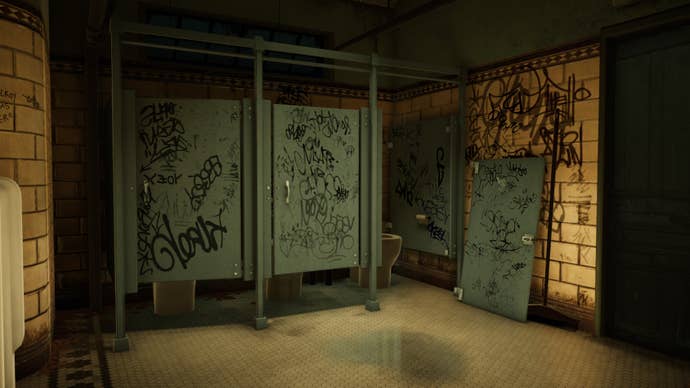
Outside of the game itself, Yang's faced animosity from the streaming service Twitch. His games have nearly all been banned on the platform, but with no word tossed his way as to why. (When I reached out to Twitch for comment on their criteria for blanket banning games and if they ever have plans to change their policy, they simply directed me to their banned games list.) For all Yang knows, Twitch hates him. Or at least, hates his unabashedly gay games. That's why in The Tearoom, Yang swapped what would otherwise be penises into guns. Guns are a familiar image in games, but they're also beacon for masculinity.
It's a relevant venture, given 53 percent of men in Humphrey's Tearoom Trade study identified as heterosexual, despite frequenting tearooms. "Many of these men don't think tearoom sex qualifies as real sex," wrote Yang in his blog. "These penises might as well be guns for all they care, they're just appreciating each others' equipment and masculinity, and helping each other out with their "not gay" urges—and sometimes even while hating gay people?"
"You can't have sex without politics, and you can't really have politics without sex either."
That said, if the sexually unexplicit The Tearoom gets banned for some odd reason, it wouldn't be new for Yang. He's stood in front of thousands of game developers at the Game Developer's Conference, complained about Twitch's baffling policy, and nothing's really happened as a result. It's an endless cycle of shouting out into the void, and Yang's left to weather it all. There's still hope though: At the time of this writing The Tearoom is not banned, and even has a handful of archived streams.
"The endgame for this is I keep making games and they keep getting banned and eventually I just have like my own section on the Twitch website that's just detecting my games and telling people not to play them," said Yang. "I honestly don't know what I'd really do [if The Tearoom were banned]. Because they're not dicks right? I think I succeed a little bit, in that people are talking about why they're guns and then that leads to more awareness. In the end, I'm just cynical in this age of Trump. How can anything ever change for the better? I'm just gonna have to keep on trying I guess."





